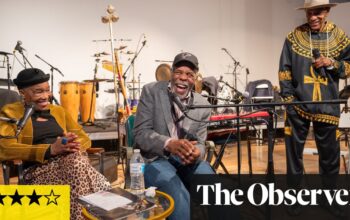I
Adrianne Lenker, a 32-year-old American musician, is dedicated to the longevity of her career in an industry known for its cutthroat pursuit of the next big hit. Speaking with the mindset of a marathon runner, Lenker sees herself as a “craftsperson” who has been honing her skills since she wrote her first song at the young age of eight. Now, with her debut album recorded at 13, she is still in the process of learning and growing as an artist. Despite her years of experience, she humbly considers herself a beginner with a continuous desire to improve her songwriting and musicianship. Some of her songs are described as “strong and durable”, with the potential to remain a part of her repertoire well into her 60s.
However, she is moving at a faster pace, similar to a sprint. Lenker holds the main vocalist, primary songwriter, and guitarist roles in the acclaimed folk rock group Big Thief. The band’s fifth album, “Dragon New Warm Mountain I Believe in You”, was a lengthy release with 20 tracks and was praised by the Observer as “wonderful”. It is considered their most diverse and expansive album to date. Lenker is also preparing to launch her fifth solo album, “Bright Future”, following the double release of “Songs” and “Instrumentals” in 2020. She has also released compilations and multiple EPs with her current bandmate and ex-husband Buck Meek, which will be discussed later.
The band Big Thief has a talent for gradually capturing your attention: while it may require multiple listens for the melodies to fully unfold, once they do, they feel like an integral part of your inner world forever. Along with receiving high praise from critics and earning five Grammy nominations, they have also gained a dedicated fan base due to their refined American sound. The combination of lead singer Lenker’s graceful and emotional vocals with strong guitar and distortion create a powerful listening experience. On the remarkable song “Not”, which was named by former president Barack Obama as one of his favorites in 2019, Lenker describes something by listing what it is not – “the lines on your face”, “the starkness of slate” – gradually building intensity until the song reaches a spine-tingling climax. The fact that it is not even among the band’s top 10 most popular songs on Spotify speaks to the wide range and high quality of their music.

Display the image in full screen mode.
Having a conversation with Lenker is akin to experiencing her music: full of poetry, exploration, and occasional moments of revelation. Currently, she is communicating from western Massachusetts, although she has been constantly on the move since leaving New York nearly ten years ago for touring. She expresses apologies for not turning on her Zoom video: “I have an injury on my cornea, which makes it uncomfortable to look at light, including the screen.” This seems appropriate for discussing her latest album, which was recorded in a secluded studio within a forest, away from modern technology. Previous records were created in cabins in the woods, the Texas desert, and the Colorado Rockies. According to the album’s co-producer and engineer Phil Weinrobe, “Adrianne and I did not once use a computer screen while making this album.”
Unplugging from technology was essential to the procedure, according to Lenker. She mentioned that the electronic energy from devices can have an impact on one’s own energy field. It can almost grab onto one’s attention and consume their focus, potentially taking a piece of their essence. The production of the album was entirely done with analogue methods, including recording on tape, mixing on an analogue console, and directly cutting the music onto an acetate used for making records. The entire band recorded simultaneously and did not use headphones. They also did not listen back to any takes, relying on Weinrobe to capture everything.
The outcome is a nostalgic record that evokes a deeply personal sentiment, the incorporation of strings and piano adding a new level of complexity to the compositions. The album begins with the sounds of shuffling and a violin being tuned, accompanied by muted laughter, before transitioning into “Real House,” a poignant track about childhood memories and the loss of innocence. “Sadness As a Gift” is a stunning, Dylan-esque reflection on a failed relationship, while “No Machine” is a delicate love song filled with anxious longing. The title, “Bright Future,” is inspired by a track that didn’t make the final cut, but still felt fitting. “Our language often limits us by associating words with opposites: we tend to equate brightness with pure positivity. However, light can also be blinding – even explosions are bright.”
B
Born in 1991 in Indiana and raised in Minnesota, Lenker had a wandering childhood that involved moving between various Christian cults, each with varying levels of devotion. She recalls a strict and repressive upbringing where even something as simple as letting the Bible touch the ground was seen as a sinful act. Her parents were only 21 when they had her and after escaping the first cult, they lived in a van for several years before staying with some Amish women. However, they eventually returned to religion, exploring different cults until Lenker was around 9 or 10. Eventually, they left organized religion altogether for a more extreme lifestyle. Amidst all the chaos and her parents’ search for spiritual fulfillment, Lenker formed her own personal relationship with spirituality. While it remains a significant aspect of her life, she no longer sees it tied to any particular religion, describing it as more of a personal connection to a higher power. (These days, she sees spirituality as “a huge part of me, but it’s not religion based, it’s more my own connection to – you could call it God, you could call it a higher power”.)
Lenker was a contemplative child who had a tendency to stare for long periods of time, often making those around her feel uneasy. She enjoyed outdoor activities such as running in the forest, making friends with boys, and engaging in physical games like wrestling, football, and building forts. She also had a fascination with gathering metal scraps and harbored a desire to become an inventor. Lenker explains, “I had a strong curiosity for fantastical objects that could transport me to a different world, perhaps as a means of escaping from the struggles I faced as a child.”

Music became a means of escape for her. Her father’s influence, who would write songs into the late hours of the night, led her to pick up the guitar. Rather than learning existing music, she taught herself how to play by writing her own songs. She explains, “I turned to songwriting out of necessity – I needed a safe outlet for all my emotions.” Her parents went through a divorce when she was 12 years old and in her teenage years, she struggled with drug and alcohol use. However, she eventually made the decision to step away from those harmful habits. She shares, “While I was hurting myself in that way, I was able to find supportive friends who were focused on healthy living and natural foods.” After being homeschooled for years, she was offered a full scholarship to attend Berklee College of Music in Boston, where she formed her first band.
During our conversation, she had just completed a four-week virtual songwriting workshop, sharing that she had not felt that anxious since her very first time performing on stage. This was her first experience breaking down her creative process, and she came to realize that a crucial aspect of it was protecting the source of her inspiration. In her words, “I emphasized in class the importance of checking your foundations: if you feel numb or disconnected, you must acknowledge that something is impeding you, and then ascertain what that obstacle is. For me, it usually boils down to maintaining a regular sleep schedule, eating nourishing meals, exercising regularly, and reading before bed instead of looking at a screen. There are numerous opportunities to slip into autopilot, and it can happen so subtly.”
On the other end of the spectrum, there is a potential for excessive emotional strain, which can be particularly challenging to handle while on tour. Lenker is a dynamic performer, fully immersing herself in the experience (our reviewer, Kitty Empire, describes her guitar solos as “filled with frustration and agony, both angry and ecstatic”). Shortly before the pandemic, after six years of near-constant touring, Lenker ended up in the hospital: “I hit a breaking point – I had just been surviving day to day.” Giving honest and vulnerable live performances on a nightly basis can be draining, but she discovered that disconnecting emotionally only led to weaker shows; she continues to work on finding a healthy balance. “I am improving at this. One thing that helps me protect myself is knowing that we’re all coming together through music, like gathering around a warm fire. And even as one of the musicians playing, I am also there to warm myself by that fire.”
Strengthening relationships among the members of Big Thief is a top priority. The band has made unofficial group therapy a regular practice since the beginning, recognizing that they cannot create music together unless they feel connected. This was especially crucial during the divorce of guitarist Buck Meek, as the band’s lead singer Adrianne Lenker explains, “We wouldn’t have been able to survive as a band if we couldn’t truly open up and support each other during that time.” Despite the difficult circumstances, they were able to work through it together and maintain a strong bond. Lenker reflects on their love for each other, saying, “Our love for each other is real and enduring, and it’s what allowed us to come out of the situation as even better friends. We didn’t ignore our problems or sweep them under the rug, but rather faced them head on and rebuilt our relationships from the ground up.”
The band will need to discuss the complex issue of the current situation in Israel and Gaza. In 2022, Big Thief cancelled two planned concerts in Tel Aviv due to backlash from fans. The bassist, Max Oleartchik, is from Tel Aviv. In a statement, the band expressed their opposition to the illegal occupation and oppression of the Palestinian people. Lead singer Lenker is not prepared to comment on this issue currently, stating that they are still processing it. Recently, Lenker made a post on Instagram calling for a permanent and immediate ceasefire and announced a new collection of songs where all proceeds will be donated to the Palestine Children’s Relief Fund. She also shared her sadness and anger towards the ongoing violence against Palestinians and urged for it to stop.
Indigo Sparke, a musician, was the subject of Songs and Instrumentals, a track titled Music for Indigo. The album, Bright Future, explores the pressure of conforming to heteronormative expectations. One of the songs, Fool, ponders on the idea of being in a relationship with someone of the same gender. Another track, Vampire Empire, a cover of a Big Thief song, expresses the desire to break free from traditional gender roles. The artist acknowledges the impact of societal structures on individuals, stating that no one is immune from their dysfunction. While oppression affects the oppressed the most, it also affects the oppressors. The artist rejects the idea of conforming to societal expectations and advocates for breaking out of the binary of gender roles. Ultimately, the artist desires a relationship that goes beyond traditional norms and exceeds their own imagination.
She doubts the validity of claims that the music industry has become more inclusive of women, especially in light of the all-female Grammy winners. She believes that the concept of women’s empowerment is still in its early stages and it will take time to truly dismantle the underlying systems that perpetuate inequality. While she acknowledges that winning a Grammy is a significant achievement, she questions the standards for awarding success, pointing out that it often prioritizes popularity and financial success rather than true talent and hard work. She emphasizes that her issue is not with the deserving winners, but with the flawed system that overlooks and undervalues the dedicated artists who have been consistently producing quality work for years.
If she had the opportunity, who would she award a Grammy to?
“I have no doubt, it’s Tucker Zimmerman,” she answers confidently. “His songs are unbelievably well-crafted – on par with John Prine’s skill. Despite having held various manual labor jobs, he remains one of the kindest, most caring individuals. In his 80s, he even managed to release a new album with original songs.”
The impression is that Lenker is following this trajectory, choosing to prioritize stability and long-term success over indulging in rock and roll clichés. In her youth, she believed that suffering was necessary for creating great music. However, she has since realized that pain is an inherent part of life for everyone, regardless of their profession. There is no need to actively seek it out. As humans, we all experience loss and must let go of things along the way, including our loved ones and eventually ourselves. Reflecting on her past experiences with excess, Lenker cannot comprehend how some managed to perform the next day. She does not believe she would have the ability to function and be present in the moment.
Everything ultimately comes down to remaining receptive to the world around you. “There is an abundance of topics to explore, contemplate, and empathize with: never-ending suffering and sorrow, but also boundless amounts of splendor and happiness.”
-
The label 4AD will be releasing Bright Future on 22 March, while Adrianne Lenker will be touring the UK and Ireland from 19-29 April.
Source: theguardian.com


